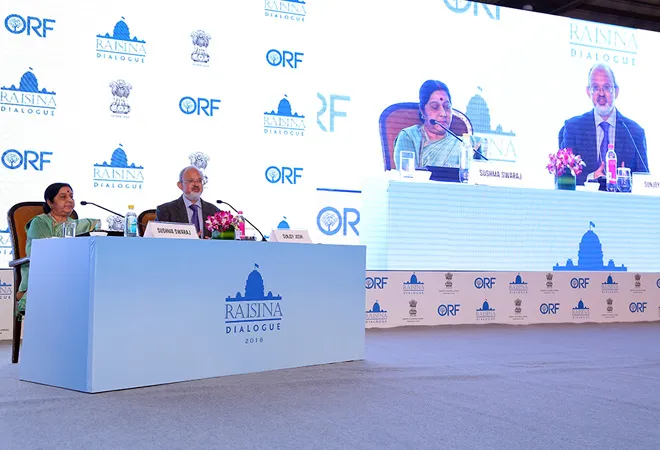-
CENTRES
Progammes & Centres
Location
To expect that an activity which draws on all the ills of the world — fanaticism, crime, bloodshed and illegal trade — will not have a corrosive impact beyond its intended arena is unrealistic.

India’s Minister of External Affairs, Smt Sushma Swaraj, on Wednesday delivered the first ministerial address of the Raisina Dialogue 2018. The session was moderated by ORF Chairman Mr. Sunjoy Joshi.
Saying terrorism from governed spaces is more dangerous, Smt. Sushma Swaraj reiterated India’s call for “zero-tolerance” against this increasing menace. “Ensuring zero-tolerance towards terrorism is the call of the day,” she said.
The Raisina Dialogue is organised by the Ministry of External Affairs and Observer Research Foundation in New Delhi. The three-day Dialogue, this year themed on ‘Managing Disruptive Transitions: Ideas, Institutions & Idioms,’ was inaugurated Tuesday night by Israel’s visiting Prime Minister Mr. Benjamin Netanyahu in the presence of Indian PM Mr. Narendra Modi and Smt. Swaraj.
“Terrorism is undeniably the mother of all disruptions today. Our attitude towards it has evolved in the last few decades. There was a time when it was seen as other people’s problem or a law and order situation. Not just that, it was also actively utilised as an instrument of statecraft. That time has long gone by,” said Smt. Swaraj.
She said we are all now very clear that terrorism anywhere can threaten societies everywhere. “The challenge is even more serious in a digital age, with greater propensity to radicalisation. However, there are still old assumptions and established mindsets in this regard. Partly because of the 9/11 precedent, we associate terrorism with ungoverned spaces,” Smt. Swaraj said.She said the more recent example of ISIS has reinforced this stereotype. “While not without basis, what is even more dangerous is terrorism from governed spaces; in fact, terrorism actively supported and sponsored by states,” Smt. Swaraj said.
She said that to expect that an activity which draws on all the ills of the world — fanaticism, crime, bloodshed and illegal trade — will not have a corrosive impact beyond its intended arena is unrealistic.
She delivered a stern warning saying the message is particularly to those who continue to believe that it can be an instrument of convenience. Smt. Swaraj also warned against the threat of proliferation of weapons of mass destruction, saying it is another disruptive element that this edition of the Raisina Dialogue would be discussing. “While it has its own history, we should not ignore the fact that proliferation threats are encouraged in large measure by arguments that favour the actual use of WMDs, especially nuclear weapons. I am glad that there is also a session devoted to nuclear unpredictability.” She said support for proliferation may also not just be theoretical. Many contemporary developments have their roots in longstanding proliferation linkages that the world deliberately chose to overlook.“Like terrorism, nuclear proliferation cannot be addressed effectively in a segmented manner. Fuller disclosure and greater accountability are a must,”the Minister said.
The Minister spoke in detail on the connectivity schemes of the government and also the need to ensure maritime security.She said: “We may debate the nature and outcome of our interdependence. But the reality is that even in disruptions, what happens in one part of the world can no longer leave the others unaffected, whether it is in terms of outcomes or ideas.”
She also talked about the retreat of globalisation and societies having more defensive mindset, struggling to protect their interests, even if it means moving away from political correctness. “In a historical sense, we can see this, as a natural rise and decline of societies.”The Minister said the world is transition. While the old order is expressing its limitations through both policy and posture, the new order is far from being clear. “For the foreseeable future, it appears, that nations with growing capabilities and larger awareness will have to step forward and bear more responsibility.”
She pointed out that on India’s part, this is already happening — whether it is the civil war in Yemen, the earthquake in Nepal, the landslides in Sri Lanka, the water crisis in Maldives, the cyclone in Myanmar or the typhoon in Fiji.The Dialogue is having over 50 sessions. “The success of the Dialogue is underlined by the fact, that this year we have participation from over 86 countries. I am happy to learn that 33% of the panellists in this dialogue are women,” Smt. Swaraj said.
She said the manner in which international politics is being conducted is itself undergoing a significant change. Understandably, diplomacy has become more bilateral, of late, with nations, pursuing their immediate interests with greater focus and vigour. She said having noted that, we cannot overlook the fact that regional and multilateral efforts remain in play to a large measure. The Minister said contemporary diplomacy has responded to the limitations of both bilateralism and multilateralism by not only seeking more regionalism but also coming up with innovative and flexible groupings that are focused on issues and challenges. She said the rise of the plurilateral and the minilateral may well be one of the innovations of this transition. “There may even be a new rationale for older groupings such as the Commonwealth,” the Minister added.Text of speech of Foreign Minister
The views expressed above belong to the author(s). ORF research and analyses now available on Telegram! Click here to access our curated content — blogs, longforms and interviews.